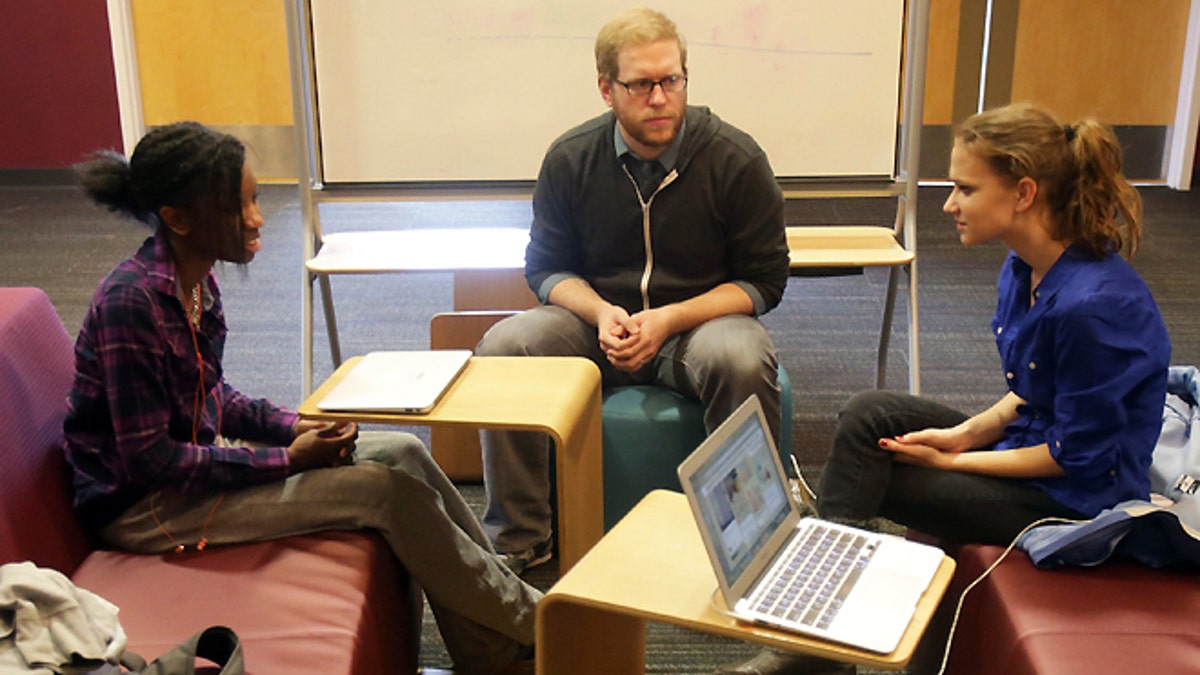
FILE -- English teacher Tom Rademacher talks with his high school juniors Kierra Murray, left, and Ana Silverman, right, at Fair School in Minneapolis. (AP Photo/Jim Mone)
I have spent part of my high school years in three countries on three continents. I spent the majority of my ninth grade year living with a Chinese family in Beijing, my tenth grade year at a New England prep school, and the spring semester of my eleventh grade year at the African Leadership Academy (ALA) in Johannesburg, South Africa.
While in Asia, I occasionally traveled around China with my host family and learned about many other regional cultures. I even visited North Korea for five days as part of a small humanitarian delegation assisting in relief efforts in an area overrun by massive flooding.
In my time at prep school in the United States, I learned the traditional rigors of an American high school education.
Finally, in South Africa, studying at ALA, I learned about the school’s mission to teach students leadership and entrepreneurial abilities to bring back to their home countries.
From these experiences, I was struck by the contrast between my expectations and the reality of the attitudes of my peers around the world.
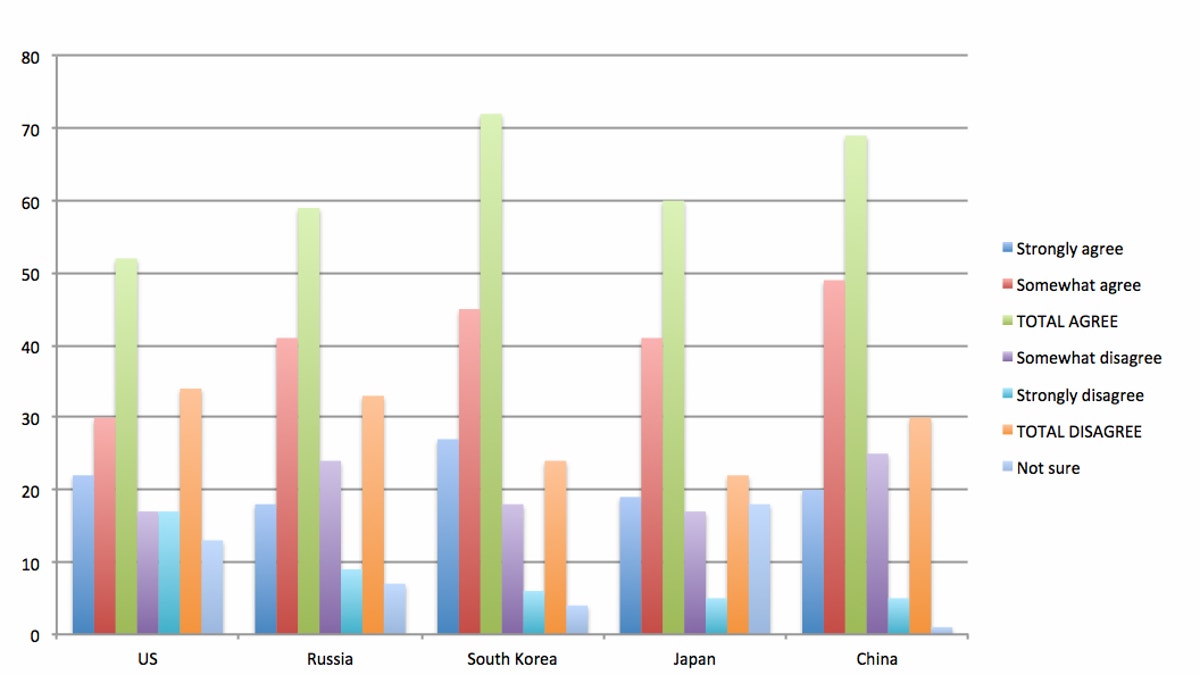
Teenagers in the U.S., China, and Africa, despite very different backgrounds and experiences, shared similar hopes and fears about our world’s future.
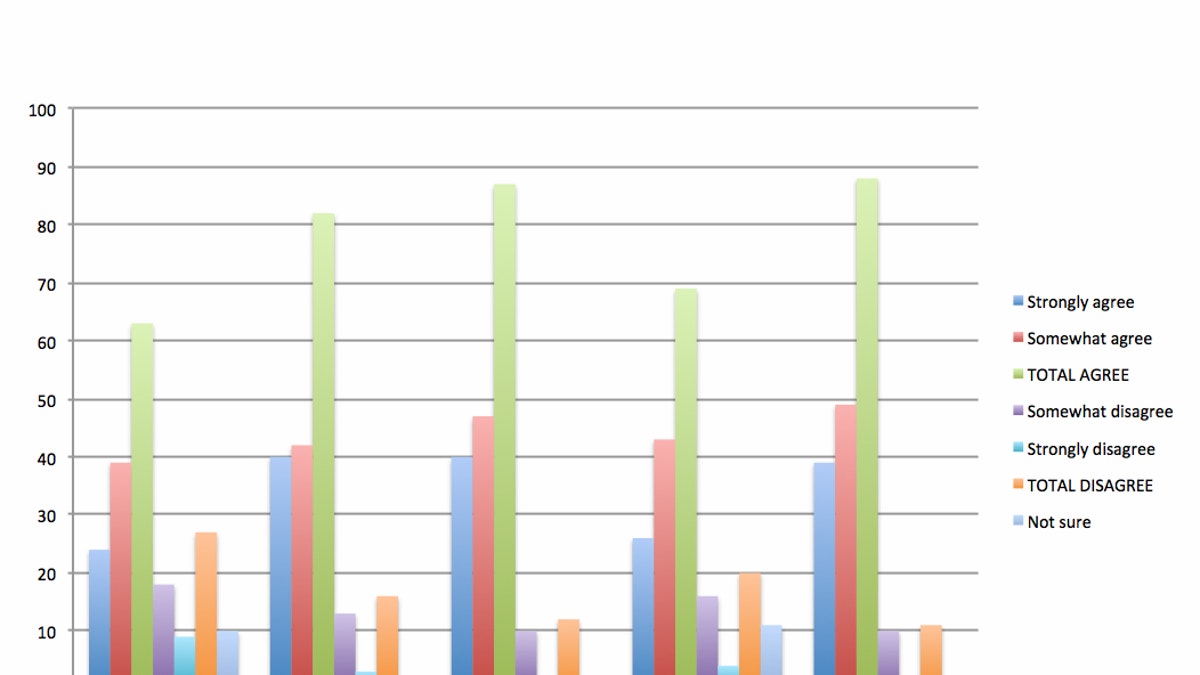
My curiosity and desire to document attitudes of my generation led me to spearhead a study of young peoples’ opinions on a variety of subjects relating to personal success, happiness, educational attainment, family structure, national and international institutions, and the future. To accomplish this, I worked with two separate polling firms and designed a poll that surveyed young people ages 16 to 29 years old in the United States, Russia, China, Japan, and South Korea.
The findings of the poll were not only intriguing, but in many ways inspiring. Broadly, the results cover young peoples’ doubts and hesitations about their lives, those of their families, and the societies in which they live. The results also reveal their hopes and aspirations and, most importantly, their beliefs in themselves.
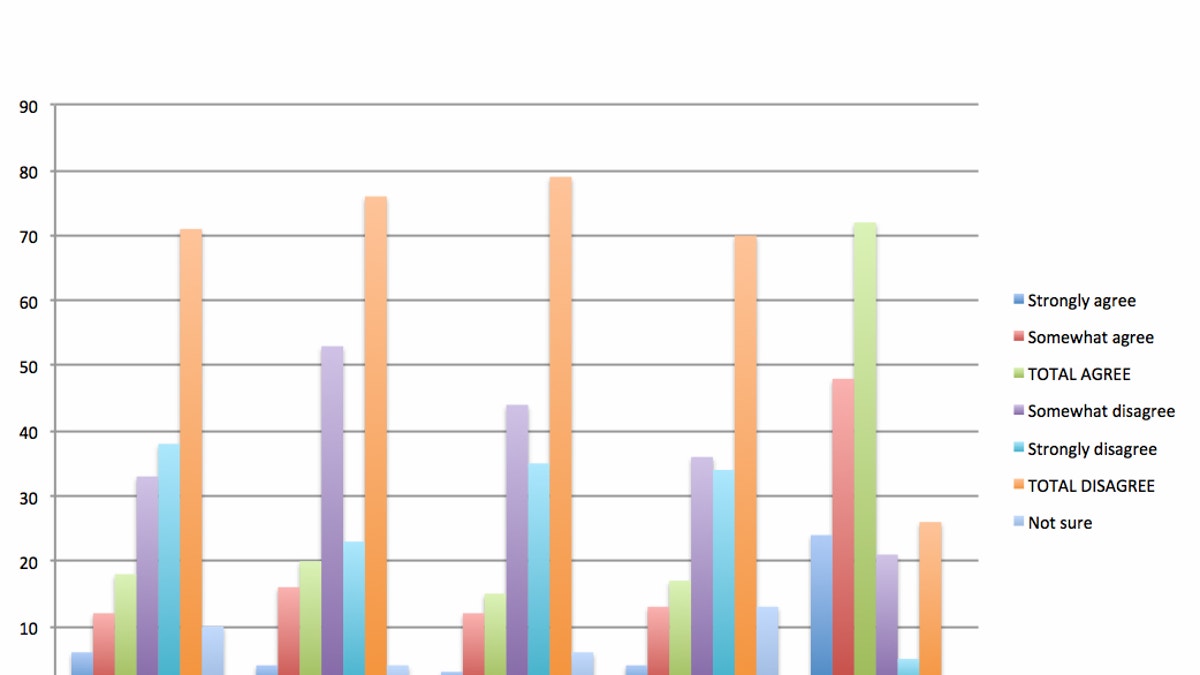
An in-depth analysis of a few critical topics covered within the poll is illustrative. Beginning with personal future outlook, it is striking to observe that young people are widely pessimistic about the world they will inherit.
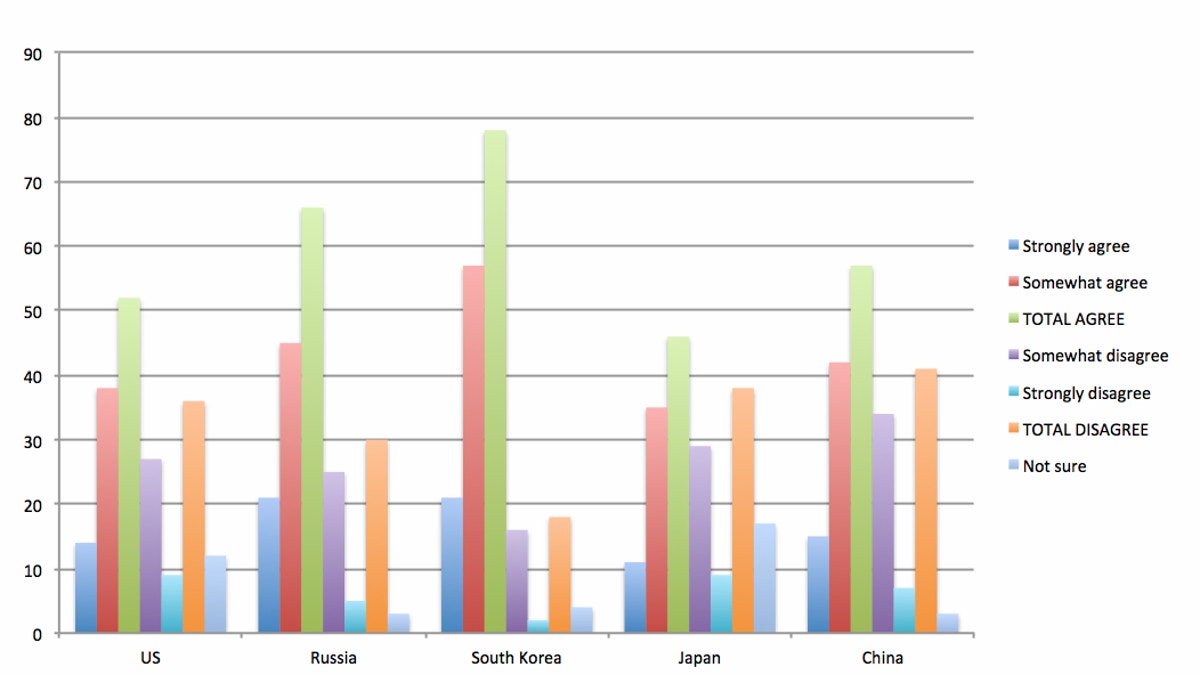
This is illustrated by responses shown in the charts below. As one can see in Chart 1, more than 50 percent of young people in each country either strongly or somewhat agree that they do not have the same chances of success as past generations.
This is true for 52 percent of respondents in the U.S., 58 percent in Russia, 59 percent in Japan, and climbs to 69 percent in China and 72 percent in South Korea.
When it comes to job prospects, young people are even more pessimistic. As Chart 2 indicates, well over 60 percent of young people agree that it is too hard to get a good job that pays enough to live well. In this area the U.S. has the lowest levels of pessimism, yet the percentage runs as high as 62 percent. Japan follows the increasing trend with 69 percent. South Korea, China, and Russia experience even higher levels tallying over 80 percent in each country.
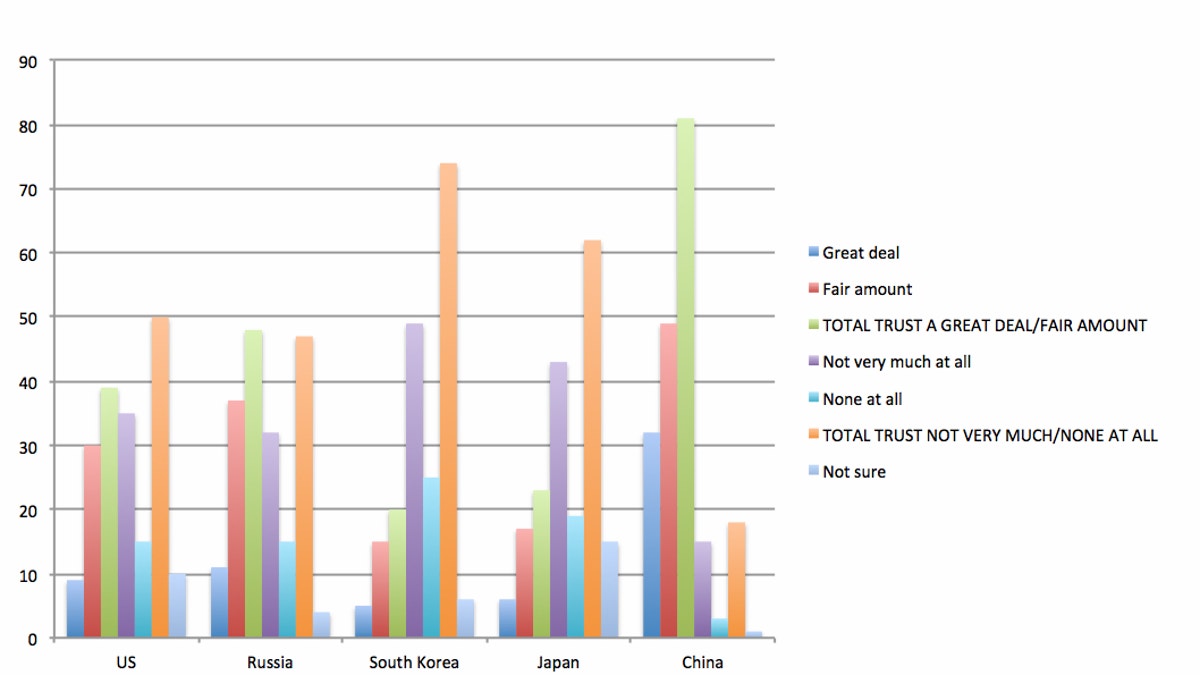
Chart 1
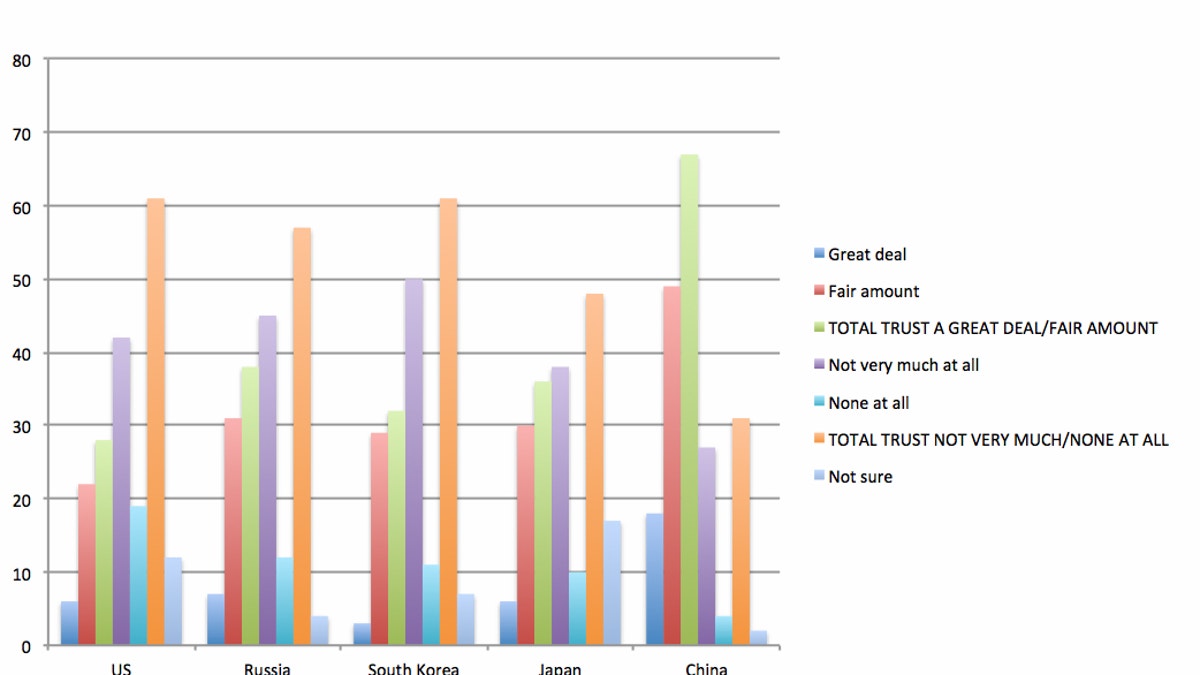
Chart 2
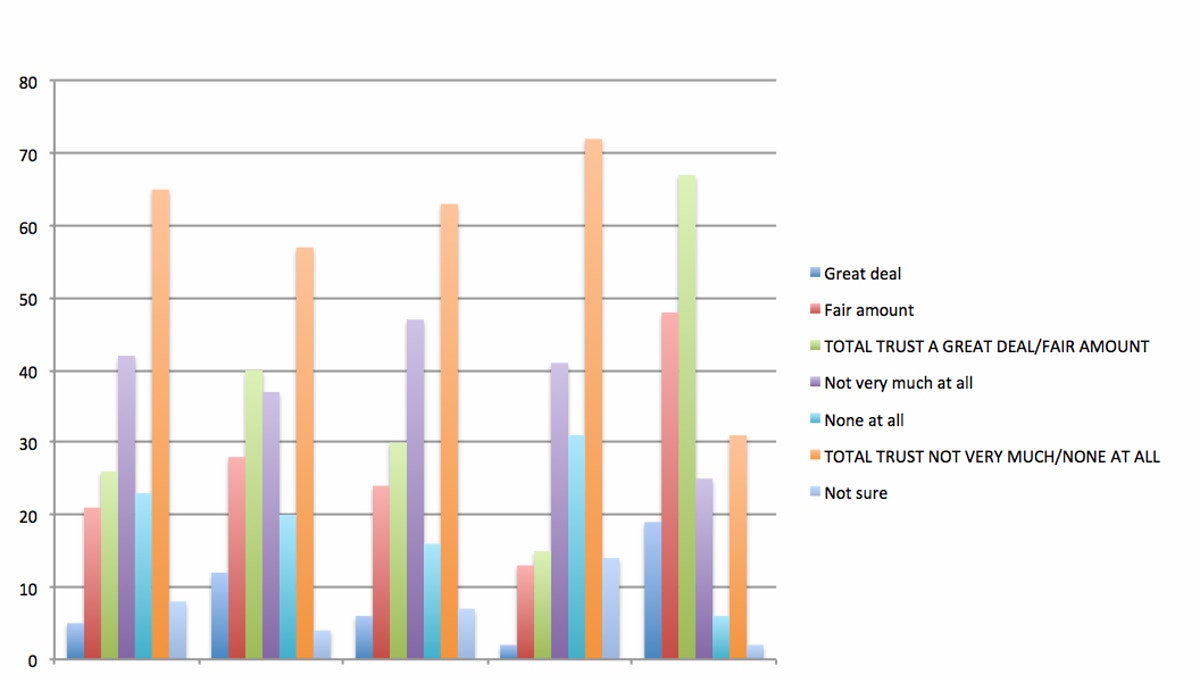
Unfortunately, prospects are even worse when young people are asked whether they believe society as a whole is “open and fair to everyone.” Respondents’ answers, shown in Charts 3 and 4 below, represent perhaps the most striking result of the entire poll.
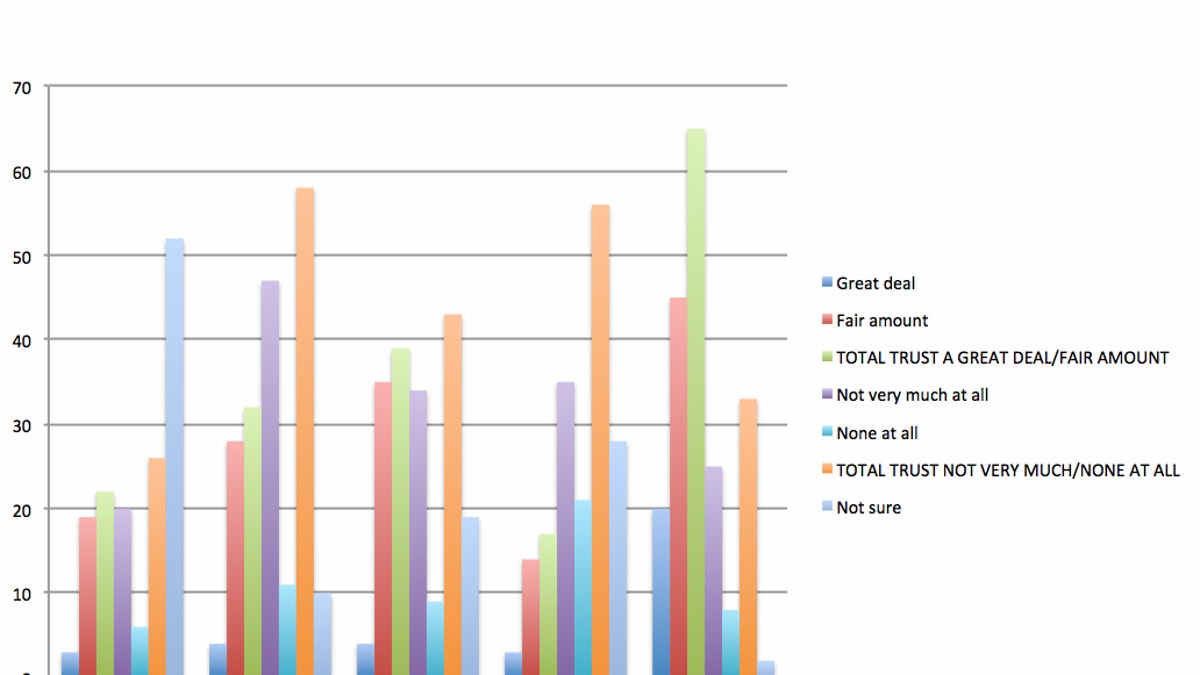
In all countries polled, at least 70 percent of young people disagree with the statement their society is “open and fair to everyone.” These same individuals felt that personal connections matter a great deal to “getting ahead” by large margins of 46 to 78 percent.
Chart 3
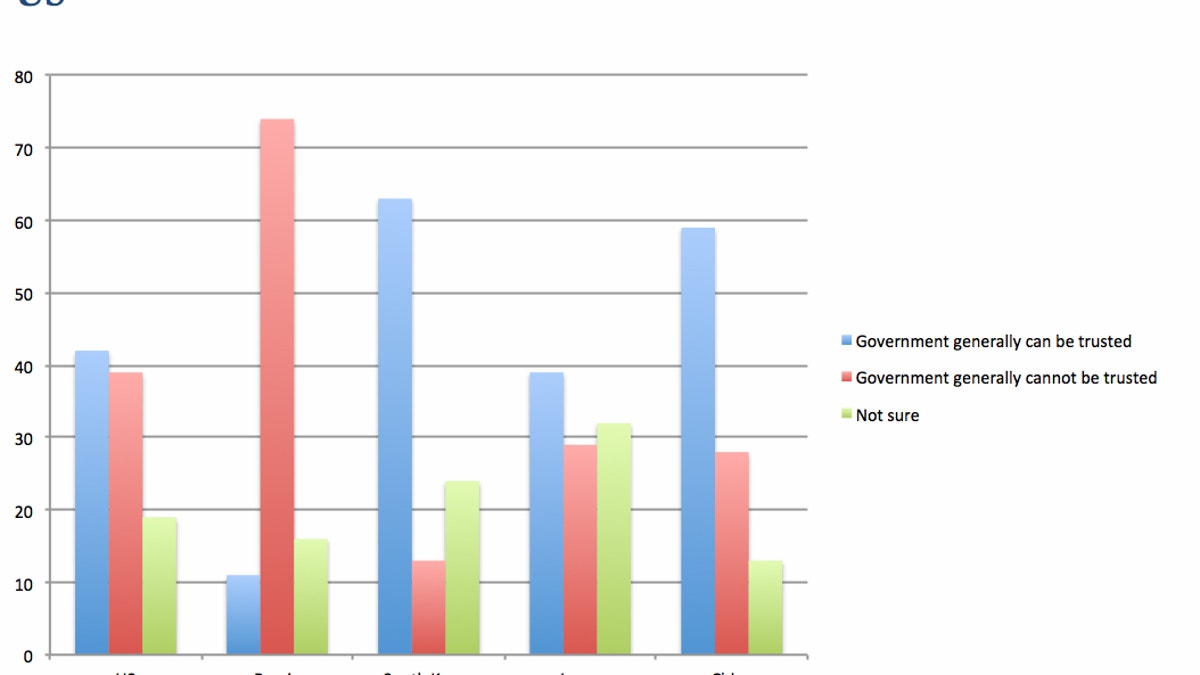
Chart 4
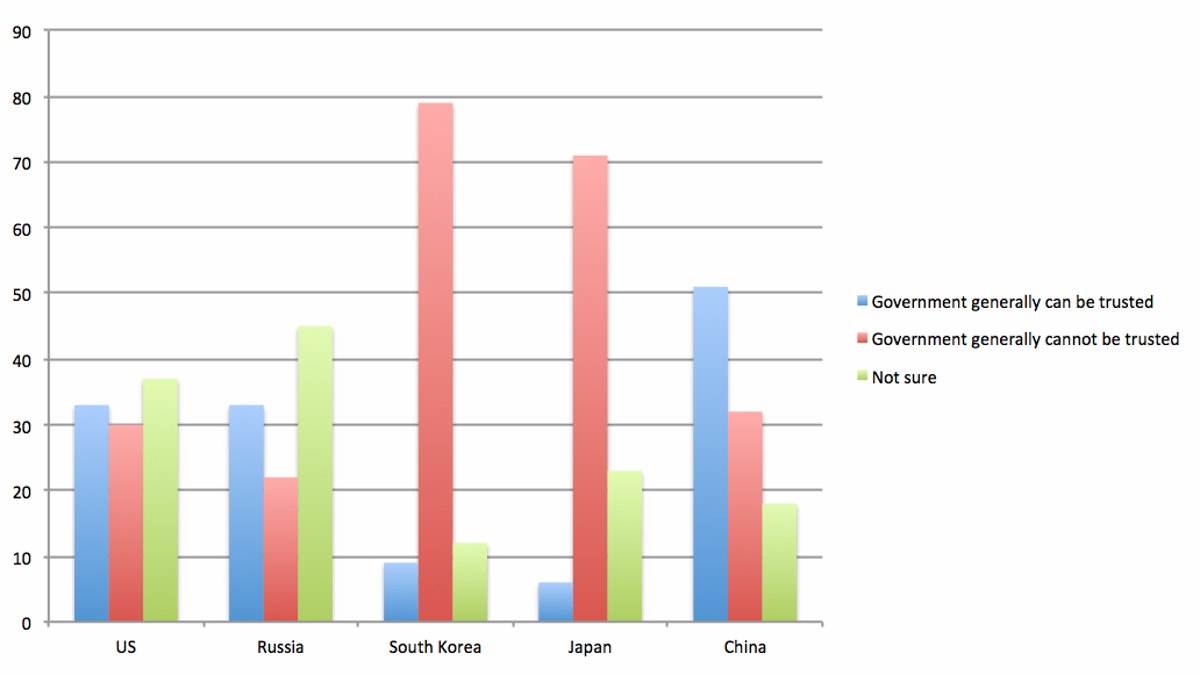
Furthermore, young people seem to be considerably skeptical of central, societal institutions, with the exception of China where trust remains strong. Chinese young people have a great deal or fair amount of trust in the government (80 percent), financial institutions (68 percent), the media (67 percent), and NGOS (65 percent).
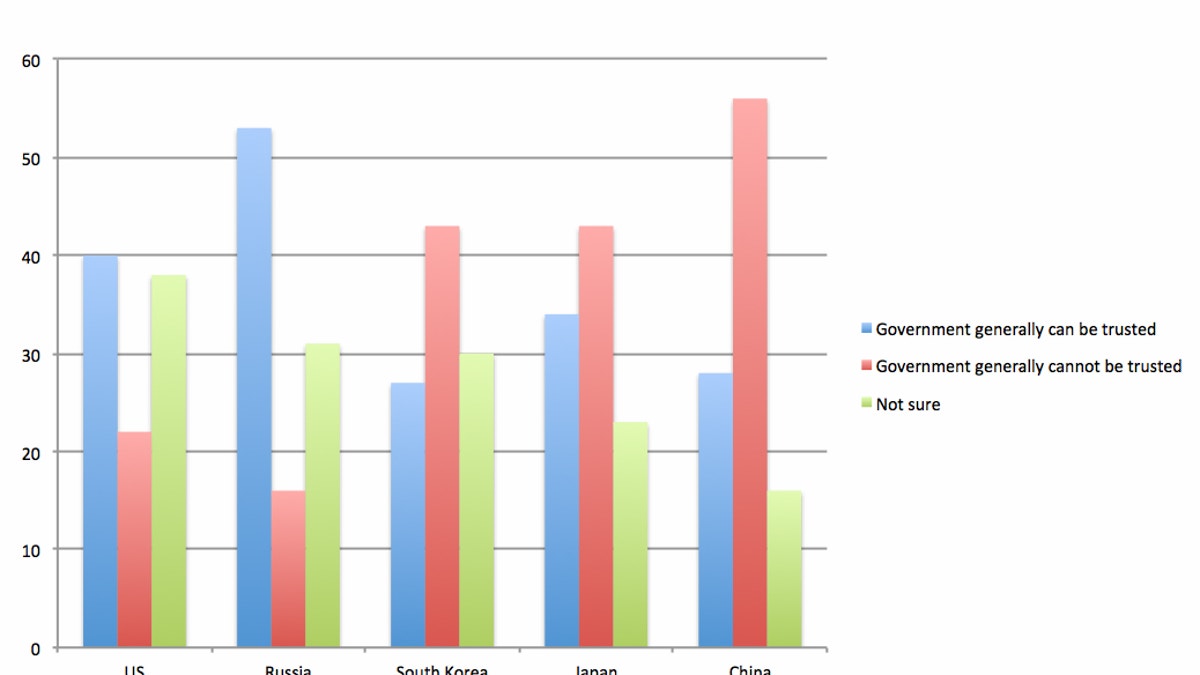
Elsewhere, figures are surprisingly low. In the United States, the federal government, financial institutions, media outlets, and NGOs are each trusted a great deal or fair amount by only 27 to 38 percent of young people. In Russia, the range of these figures is 32 to 48 percent, 20 to 38 percent in South Korea and a mere 15 to 36 percent in Japan.
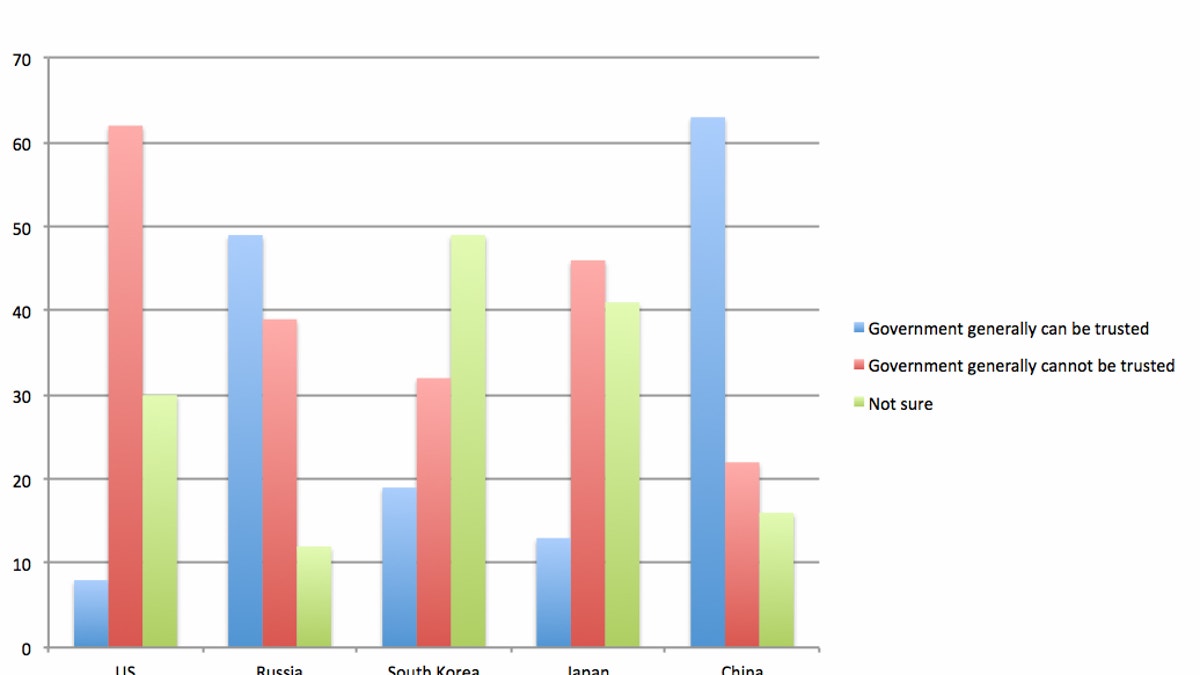
Chart 5
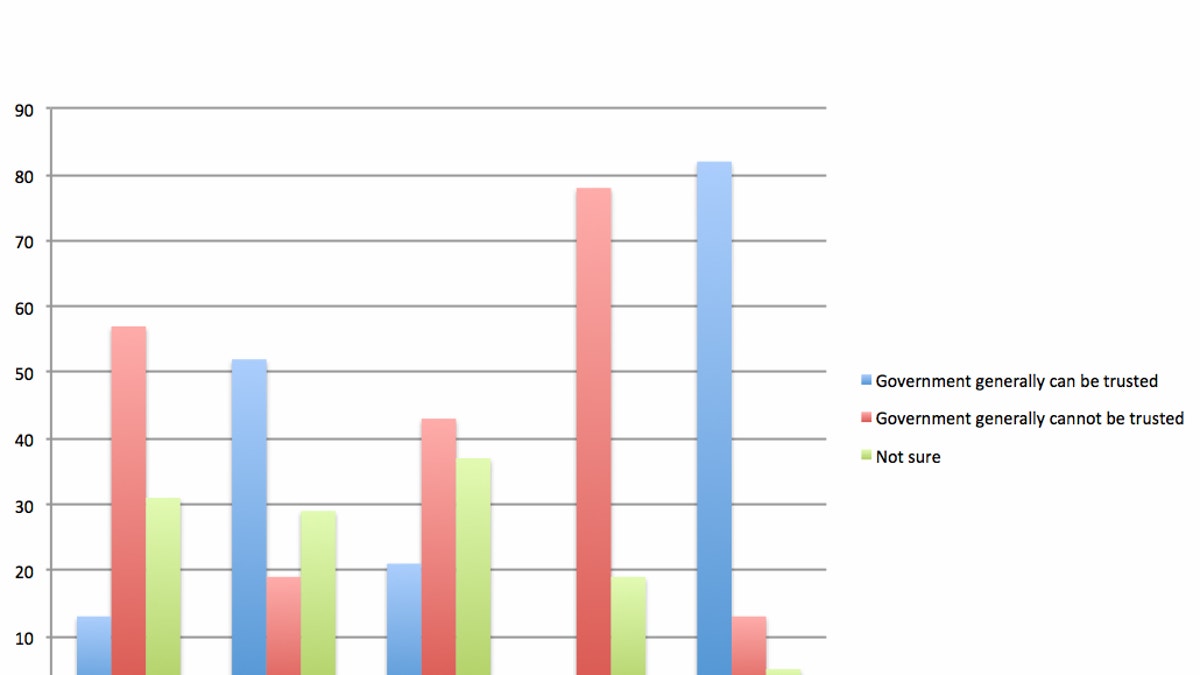
Chart 6
Chart 7
Chart 8
There are also interesting trends pertaining to how young people in the nations surveyed feel about comparable institutions in other nations.
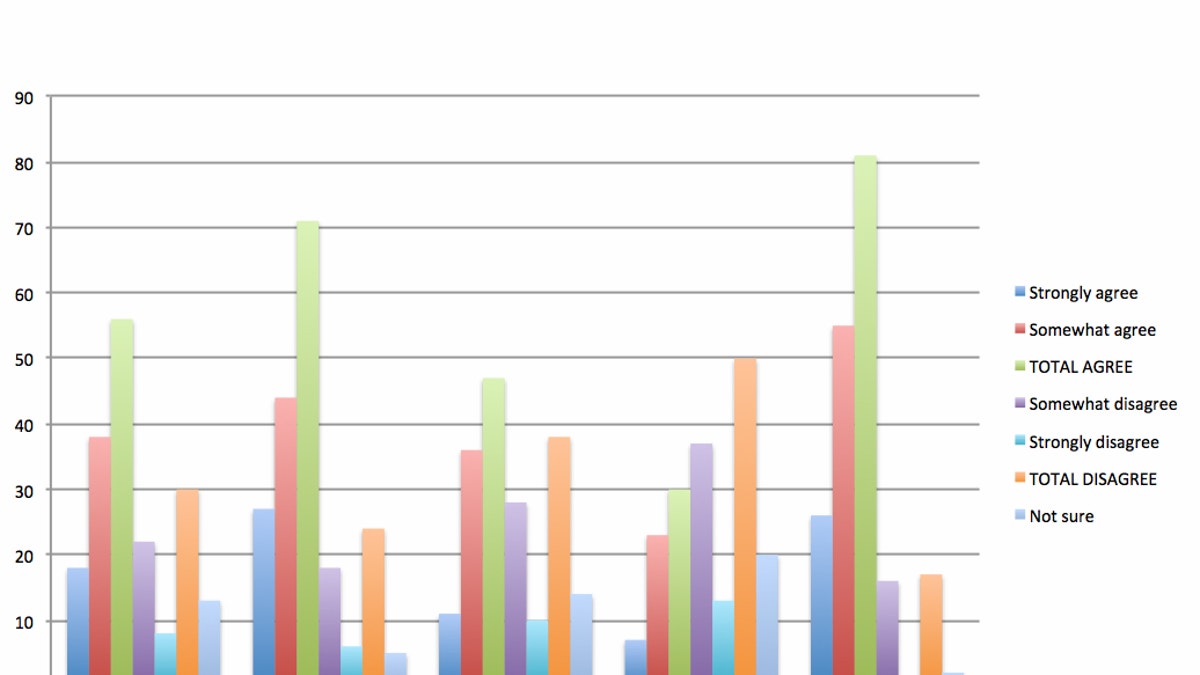
The following charts show that young people in the U.S. believe that the Russian government cannot be trusted.
Young people in South Korea do not trust the Japanese government, and Japanese young people do not trust the Chinese government.
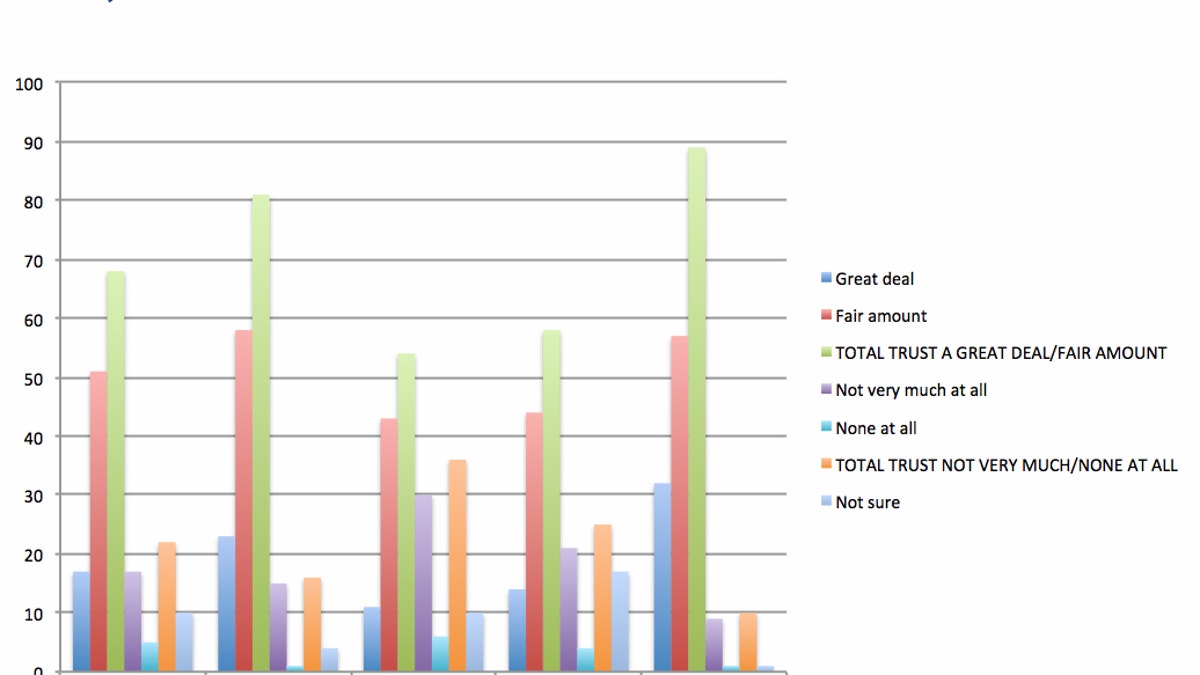
In terms of young Russians levels of trust, they trust the Chinese government the most and the U.S. government the least.
Finally, in regard to Chinese young people, they trust their own government the most and the Japanese government the least, followed closely by low trust levels of the American government.
Chart 9
Chart 10
Chart 11
Chart 12
Chart 13
This information offers a bleak picture. Young people find modern societies to be fundamentally unfair environments in which one needs connections to get ahead and, even then, young people are not likely to do better than their parents. Moreover, based on these results, it looks unlikely that widely untrusted government institutions could ever fix this problem.
There are, however, three critical bright spots worth mentioning.
First and most important, young people have faith in themselves. They may not think that their generation as a whole will do better than their parents, but they do believe, as individuals, that they can achieve more.
As shown below in Chart 14, at least 45 percent of young people polled in Russia, China, South Korea, and the United States either somewhat agree or strongly agree that they will be able to achieve more than their parents.
Chart 14
Second, and perhaps unsurprisingly so, young people in all countries polled uniformly hold strong beliefs in the power of technology.
Chart 15
Third young people today seem to be motivated by an aspiration to make the world better. When asked the question “what does it mean to succeed?” most respondents agreed with the sentiment, “to leave a better world for the next generation.” More than 70 percent of young people in all five countries believed that this was either very much or sort of what means to succeed.
What does this all mean?
Taken as a whole, this global poll – which is the first of its kind – gives compelling and comprehensive evidence that young people are pessimistic about the future they will inherit and do not see societal institutions as capable of solving modern problems.
Young people have little to no faith in institutions’ abilities in making decisions, guiding society, and being reliable.
It follows that the poll results demonstrate, in no uncertain terms, that young people today do not believe that our leaders can offer them a path to prosperity and success. Instead, young people consistently believe they must make their own way.
Thus, across the globe, these individuals have decided that they will need to rely on themselves and technology to create a better future.
To be sure, the attitude of each generation is molded by the environment in which they come of age. Undoubtedly, this environment is influenced by the previous generation.
The “greatest generation” built a society of increasing opportunity through personal sacrifice, allowing their children – the baby boomers – to grow up optimistic about their own futures.
It could be argued that the baby boomers and their children, however, were more concerned with consuming and enjoying that future than sacrificing in turn to create even greater opportunity for their own children. This may explain why there is so much pessimism about being able to do better than our parents.
Since overcoming the struggles presented by the Great Recession and multiple isolated military conflicts, my generation is often compared to the “Greatest Generation.” If that generation could come out of the ashes of World War II and refuse to accept any future except the one they wanted, there is no reason to think that my generation cannot accomplish the same. Our paths will be different, as technology will be a significant factor, but we can and will achieve the future we seek.
Author's note: I worked with YouGov in the UK and Horizon in China. Further details available.
